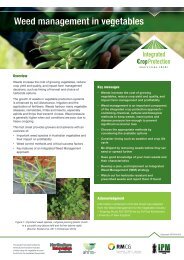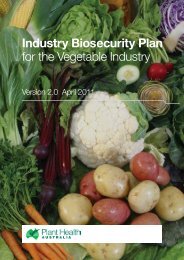vegetables
VA-NovDec2015
VA-NovDec2015
You also want an ePaper? Increase the reach of your titles
YUMPU automatically turns print PDFs into web optimized ePapers that Google loves.
18<br />
The Front Line<br />
Biosecurity measures implemented on-farm.<br />
Photo courtesy of NT Farmers.<br />
The Australian biosecurity system<br />
under the magnifying glass<br />
THE FACE OF THE AUSTRALIAN BIOSECURITY SYSTEM IS<br />
QUICKLY EVOLVING, WITH INDUSTRY BEING REQUIRED<br />
TO TAKE AN INCREASINGLY ACTIVE ROLE IN THE SPACE.<br />
A RAPID RE-EVALUATION OF BIOSECURITY, OWNERSHIP<br />
OF ASPECTS IN THE SYSTEM AND DETERMINATION<br />
OF WHO IS RESPONSIBLE FOR MAINTAINING GOOD<br />
PRACTICE AND DECISION MAKING IS CURRENTLY IN<br />
MOTION. AUSVEG NATIONAL MANAGER – SCIENTIFIC<br />
AFFAIRS DR JESSICA LYE EXPLAINS.<br />
R&D<br />
Farm Productivity,<br />
Resource Use<br />
& Management<br />
with Dr Jessica Lye<br />
The changing landscape of<br />
Australian biosecurity has<br />
never been more evident than<br />
during 2014 and 2015, when<br />
Australia was bombarded with<br />
a range of pest incursions<br />
and insufficient resources<br />
to adequately deal with the<br />
outbreaks without strong support<br />
from industry.<br />
Recent redevelopments in<br />
state and federal biosecurity<br />
legislation has made it clear<br />
that there is a push towards<br />
simplifying our currently<br />
complex biosecurity system and<br />
making biosecurity a shared<br />
concern across government and<br />
stakeholders.<br />
Joint responsibility now<br />
enshrined in legislation<br />
The Queensland Government<br />
has ratified the new Biosecurity<br />
Act 2014, which will come<br />
into effect on 1 July 2016.<br />
A significant component<br />
of the Act is the General<br />
Biosecurity Obligation, which<br />
makes provisions for shared<br />
responsibility of biosecurity<br />
duties across industry and the<br />
wider community.<br />
The General Biosecurity<br />
Obligation places the<br />
responsibility on all persons to<br />
take reasonable and practical<br />
steps to prevent activities from<br />
causing a biosecurity event,<br />
such as spreading a pest<br />
insect or disease or introducing<br />
a weed. In introducing the<br />
obligation, the Act recognises<br />
each person’s role in preventing,<br />
eliminating or minimising<br />
biosecurity risks based on<br />
their level of knowledge and<br />
understanding.<br />
Under this obligation, all<br />
reasonable and practicable<br />
measures to prevent, eliminate<br />
or minimise the biosecurity risk<br />
must be taken. An example<br />
of a reasonable measure may<br />
be holding a meeting in a<br />
neutral location, rather than at<br />
a property that is susceptible<br />
to a pest outbreak. While the<br />
regulations resulting from the<br />
Act are not finalised, it is likely<br />
that not fulfilling the General<br />
Biosecurity Obligation will result<br />
in a warning and/or fines.<br />
Other states, such as New<br />
South Wales, are also adopting<br />
a similar concept within<br />
biosecurity legislation. The<br />
New South Wales Biosecurity<br />
Act 2015, which was assented<br />
to in September 2015 and is<br />
expected to come into effect<br />
in 2017, contains a General<br />
Biosecurity Duty. The General<br />
Biosecurity Duty can be found<br />
in Part 3 of the NSW Act.<br />
Specifically, section 22 of the<br />
Act specifies:<br />
Any person who deals<br />
with biosecurity matter or a<br />
carrier and who knows, or<br />
ought reasonably to know, the<br />
biosecurity risk posed or likely<br />
to be posed by the biosecurity<br />
matter, carrier or dealing has<br />
a biosecurity duty to ensure<br />
that, so far as is reasonably<br />
practicable, the biosecurity<br />
risk is prevented, eliminated or<br />
minimised.<br />
Update on the Federal<br />
Biosecurity Act 2015<br />
The Federal Biosecurity Bill<br />
2014 and supporting legislation<br />
received royal assent from the<br />
Governor-General on 16 June<br />
2015 and has now become<br />
the Biosecurity Act 2015. The<br />
12-month delay is to ensure<br />
clients, staff and stakeholders<br />
understand their rights and<br />
responsibilities under the new<br />
Act and that there is a smooth<br />
transition to the new regulatory<br />
arrangements.<br />
AUSVEG provided a<br />
submission on the draft<br />
Biosecurity Bill in January 2014<br />
and will be providing comment<br />
on draft regulations during<br />
the consultation period. When<br />
they are passed and come into<br />
effect, these draft regulations<br />
will supersede the Quarantine<br />
Regulations 2000.<br />
Draft regulations for<br />
Biosecurity Import Risk<br />
Analyses (BIRAs) are now<br />
available for comment from





